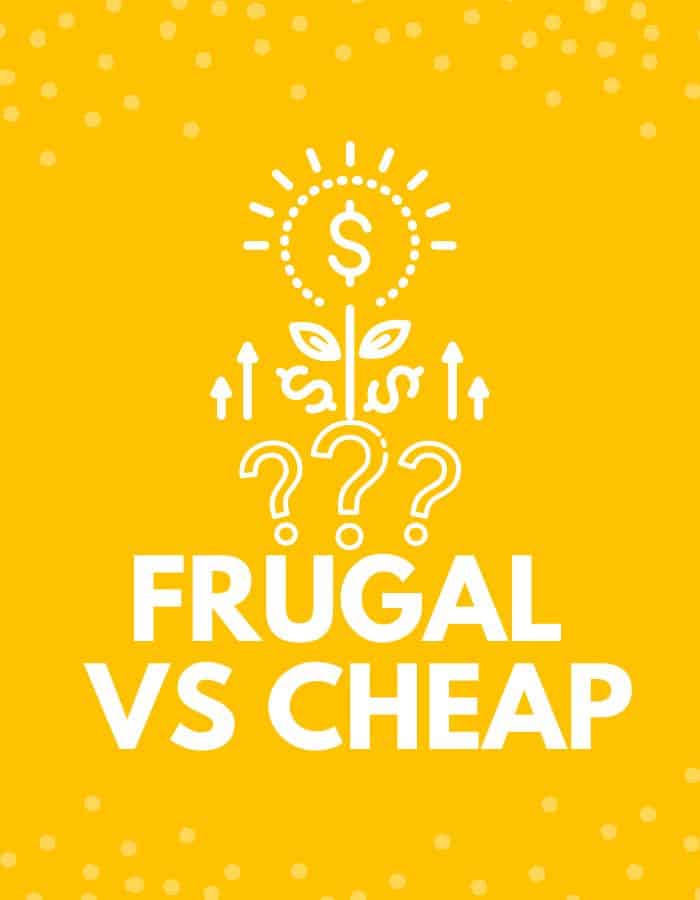We may earn money or products from the companies mentioned in this post, and as an Amazon Associate I earn from qualifying purchases. Please see my full disclosure for more information.
There can be a common misconception at times that choosing to be frugal with your money goes hand-in-hand with being considered cheap by your peers. However, there are some key differences between these two characteristics – and here, we’ll be outlining the exact differences between being frugal vs cheap.
When it comes to deciding what habits are considered frugal, and which are considered cheap, there is definitely a fine line to balance at points.

Sure, there’s also going to be some crossover where people who are just ‘cheap’ have some frugal qualities and where people who live a frugal lifestyle are just being a little…stingy.
So what’s the difference?
What is being frugal vs cheap?
Being frugal with your cash is about being mindful of how you spend your money and distribute your income. It’s about knowing what you want for your own life, and finding the best uses for your money to achieve that. Being cheap, however, is often just about spending as little as possible, short term and long term.
It’s about scrimping and saving, sometimes bordering on outright immoral (like making their friends pay for meals or stealing fistfuls of those ‘complimentary’ condiments at fast food restaurants). It’s not about spending smarter – even if some of the ideas and tricks are pretty savvy – being cheap always comes down to the attitude of the less money spent, the better.
Ultimately, being frugal means reducing your waste, be it financially or materially, while being cheap is concerned only with the price.
Definitions of frugal vs cheap
- Frugal: careful when using money or food, or (of a meal) cheap or small in amount
- Cheap: unwilling to spend money
(According to The Cambridge Dictionary)
Being cheap isn’t always bad
It’s important to note that in some ways, making the conscious decision to be frugal with your cash is a privilege that some people don’t have. While anyone can build frugal habits, sometimes the only way to get by is to stretch your cash as far as possible by shopping as cheap as possible. Being called cheap can get a bad rap, but sometimes it can be a good thing.
This post isn’t designed to shame people who identify with being ‘cheap’ more than frugal. Hell, sometimes being cheap can be a great asset to have.
Not wanting to spend your money frivolously will make it easier for you to save and accomplish your long-term goals. However, being frugal may help to shape your financial future.
Being cheap can create this cycle of a scarcity mindset. Being unwilling to spend your money may make you feel like you never actually have any money – even if your reality is different. It’s important to shape your financial habits beyond simply trying to limit your spending. Digging into the why and the when – that’s frugal living coming into play.
Acorns is a saving and investing app that makes investing easy. Unlike other investing apps where you pick and choose stocks you want to invest in, Acorns does that for you by recommending a diversified, expert-built investment portfolio of ETFs designed for long term investing.
You'll get a $5 $20 bonus signing up with our link.
Cheap vs Frugal: Major Differences
Frugal People
- Focus on reducing monetary and financial waste in their lifestyles
- Will avoid spending money on things that don’t add value to their life
- Have financial goals and a plan to achieve them
- Find ways to spend their money wisely for maximum gain
- Will invest in better quality to save money in the long-term
- Have a mindset of using their money in the best way for their financial goals
Cheap people
- Focus on spending the least amount of money, no matter what
- Will avoid spending money wherever possible
- May not have many other financial goals other than to avoid spending
- Focus on spending as little as possible on each purchase
- Will opt for lower quality for lower price points
- May not consider how their spending and behaviours affect others
5 Key Differences Between Being Frugal vs Cheap
Now we’ve outlined some core characteristics between being frugal vs cheap, it’s pretty clear that there’s a big difference between the two qualities. Let’s take a deeper look at some of those key characteristics of being a frugal person.
1. Frugality Prioritizes Value, and Cheap Prioritizes Cost
Getting the best value for money is a top priority for frugal people – even if that does mean spending slightly more in order to get a bigger return on that investment.
This includes things from food (for example, spending more on locally sourced products if being environmentally conscious is a priority for you), budgeting specifically for the quality of an item for your home, and even hobbies – i.e. making room in your budget for the things you love to spend time doing.
Cheapness, however, prioritizes the lowest cost possible, even if that doesn’t equate to the best money spent. A cheap person might buy shop at discount stores to get the lowest price, for example, whereas frugal people may invest in something higher quality to only have to buy it once.
2. Frugality doesn’t mean saving money at the expense of others but being cheap will
Being frugal with your cash means knowing when to set a boundary and saying no to activities with friends or family if that means reaching an urgent saving goal.
On the flip side, being cheap might look something like accepting an invitation out but asking someone else to cover your costs because you’re skint. A stingy person is more willing to sacrifice the financial situation of others for their own gain – for example, insisting on splitting bills to the cent or refusing events out with friends ever due to the cost.
3. Being frugal means being patient if it means getting the best deal
Spending smarter means holding off on an impulse buy if you know you’ll probably be able to find a good deal online, or wait a month or so for a sale season and get the best price.
Rather than simply buying something as soon as you see it, taking the time to do some research into the product (again, going back to that value-for-money concept), find possible discount codes and deals, and get the best price tag for an item is a major sign of a frugal person. Cheap people, however, may decide not to spend their money on that item at all if the best deals aren’t available immediately.
4. Cheap people will focus on saving money as their bottom line, whereas frugal people focus on returning the most value
Cheap people will not allow themselves to budget in some instances in order to enjoy luxury in other areas of their life. For example, a frugal person may walk instead of taking public transport, cook all their meals from home, and limit entertainment expenses in order to afford an expensive hobby that adds real value to their lives, such as travel abroad.
A cheap person, however, will have their main focus as saving as much money as possible. They won’t adopt frugal habits to accumulate a lot of money in another area of their life specifically, it’s just about costs. They won’t be focusing on the big picture.
5. Being frugal is about spending smarter – being cheap is purely about spending less
Being frugal, as the definitions above outline, is about being careful with your money. It’s not necessarily about spending less, always, but it’s more about having an awareness of where your money is going each month and why.
Being cheap means focusing on price and spending as little money as possible.
How to stop being cheap and start being more frugal?
Being more frugal really starts with a mindset shift. Instead of immediately going for the cheapest, most convenient option, start to question your priorities and your values in life and how you can better distribute your money to serve those things.
Accept that your money is there to be spent – that’s what you work so damn hard for! But make sure you are spending your money on things you actually want to spend money on (life admin and responsibilities notwithstanding)!
Here are a few tips to help you get started:
- 6. Be More Intentional: This ethos extends far beyond personal finance, but building towards a more intentional lifestyle is the cornerstone to shifting away from being cheap and towards a more frugal mentality.
- 7. Frugal green living: These frugal green living tips will show you how being more mindful of your money can go hand-in-hand with sustainable living, something we should all be aiming for.
- 8. Create some financial goals: What do you want to achieve with your financial situation? Do you have any major goals, like paying off any credit card debt or purchasing your first home? Having goals and an action plan in place will help you decide where to shift your money rather than remaining in that scarcity mindset.
Things Every Frugal Person Should Do:
A way of tracking your spending: Whether you use your phone, a spreadsheet, an app, or a budget planner, get into the habit of knowing where your money is going.
Change (or challenge) your mindset: A frugal lifestyle starts with your mindset. It means finding your priorities and values and adjusting the way you live to bring those things to the forefront when making financial decisions. While minimalism is a little different, this article on creating a minimalist mindset is a great starting point.
Frugal vs Cheap Home Quick Tips:
- Reuse Your Glass Jars: Invest in some cheap glass jars (and start washing and saving your existing ones) and put them to good use around the home.
- Storage Baskets: My motto when it comes to getting organized around the home is to give everything a home – at the end of the day, I simply make sure everything gets home safely.
Storage baskets are an essential way of keeping your home tidy and organized, taking stock of exactly what you own, and helping you be more mindful about spontaneous buys (because you’ll have to think more about where it goes!). - Meal Prep: With proper planning, you can spend money on quality, great value-for-money ingredients and still end up with cheaper (and healthier) meals than just buying the cheapest option every time you head to the shops. Check out this ultimate guide to meal planning.
Ultimately, being cheap isn’t necessarily a bad thing – but it can reduce your quality of life. Once you start evaluating your spending habits and mindfully distributing your expenses towards things that genuinely add value to your life, you can really see the benefits of living frugally without that urge to hoard all your cash.
Know someone a little cheap who isn’t great at re-paying their debts? Here are 11 effective ways to get someone who owes you money to pay you back sharpish.
